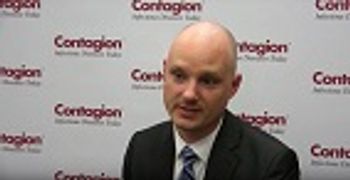
Pedro Fernando da Costa Vasconcelos, MD, PhD, director of WHO Collaborating Center for Arbovirus and Research, Evandro Chagas Institute, discusses whether or not all Zika-infected pregnant women will infect their fetuses.

Pedro Fernando da Costa Vasconcelos, MD, PhD, director of WHO Collaborating Center for Arbovirus and Research, Evandro Chagas Institute, discusses whether or not all Zika-infected pregnant women will infect their fetuses.

Kenneth Fife, MD, PhD, Professor of Medicine at Indiana University, School of Medicine, discusses manipulating the immune system to fight genital herpes.

Pedro Fernando da Costa Vasconcelos, MD, PhD, director of WHO Collaborating Center for Arbovirus and Research, Evandro Chagas Institute, discusses the likelihood that fetuses congenitally infected with the Zika virus will develop related complications, such as microcephaly.

John D'Angelo, MD, senior vice president, executive director Emergency Medicine Services at Northwell Health, discusses how hospitals use updates from the Department of Health to remain aware of any potential outbreaks.

Pedro Fernando da Costa Vasconcelos, MD, PhD, director of WHO Collaborating Center for Arbovirus and Research, Evandro Chagas Institute, discusses the possibility of the Zika virus evolving to cause other complications in the future.

Barry Kreiswirth, PhD, founding director, Public Health Research Institute Tuberculosis Center, professor of medicine at Rutgers University, discusses the “ideal” treatment method for antibiotic-resistant bacteria.

Pedro Fernando da Costa Vasconcelos, MD, PhD, director of WHO Collaborating Center for Arbovirus and Research, Evandro Chagas Institute, explains how Zika has evolved since the 1960s.

John D'Angelo, MD, senior vice president, executive director Emergency Medicine Services at Northwell Health, discusses the prevalence of tuberculosis in the United States.

Barry Kreiswirth, PhD, founding director, Public Health Research Institute Tuberculosis Center, professor of medicine at Rutgers University, discusses the alarming rate of which antibiotic-resistant strains and genes are spreading worldwide and our need for new, effective antibiotics to counteract it.

Andrew Chasteen from Accelerate Diagnostics, Inc, discusses who will benefit most from Morphokinetic Cellular Analysis, keeping in mind the challenges posed by antibiotic resistance.

Barry Kreiswirth, PhD, founding director, Public Health Research Institute Tuberculosis Center, professor of medicine at Rutgers University, explains how active surveillance can assist in the fight against antibiotic resistance.

Andrew Chasteen from Accelerate Diagnostics, Inc, explains future applications of Morphokinetic Cellular Analysis (MCA).

A varicella outbreak that had occurred last year in Michigan is thought to be associated with riding on a school bus, which makes small, enclosed spaces, such as a school bus, a risk factor for both transmitting and acquiring airborne diseases.

Barry Kreiswirth, PhD, founding director, Public Health Research Institute Tuberculosis Center, professor of medicine at Rutgers University, explains the threat of a “true” superbug.

Kirk Hevener, PharmD, PhD, assistant professor of Biomedical and Pharmaceutical Sciences at Idaho State University, College of Pharmacy, explains his research regarding topoisomerase I and II enzymes.

Barry Kreiswirth, PhD, founding director, Public Health Research Institute Tuberculosis Center, professor of medicine at Rutgers University, discusses the implications of the findings of his study.

John D'Angelo, MD, senior vice president, executive director of Emergency Medicine Services at Northwell Health, describes the importance for hospital staff to be prepared for outbreaks.

Barry Kreiswirth, PhD, founding director, Public Health Research Institute Tuberculosis Center, professor of medicine at Rutgers University, explains which populations are most susceptible to antibiotic-resistant organisms.

John D'Angelo, MD, senior vice president, executive director of Emergency Medicine Services at Northwell Health, explains why he remains optimistic in the face of antibiotic resistance.

Barry Kreiswirth, PhD, founding director, Public Health Research Institute Tuberculosis Center, professor of medicine at Rutgers University, discusses challenges associated with the approval of novel antibiotics.

John D'Angelo, MD, senior vice president, executive director of Emergency Medicine Services at Northwell Health, describes how hospital clinicians can identify and treat patients at highest risk for contracting antibiotic-resistant infections.

Kirk Hevener, PharmD, PhD, assistant professor of Biomedical and Pharmaceutical Sciences at Idaho State University, College of Pharmacy, discusses the advantages of narrow spectrum antibiotics.

David Rosenthal, DO, PhD, medical director for the Center for Young Adult, Adolescent and Pediatric HIV Care at Northwell Health, discusses how close researchers are to finding a cure for HIV.

Kirk Hevener, PharmD, PhD, assistant professor of Biomedical and Pharmaceutical Sciences at Idaho State University, College of Pharmacy, explains how clinicians can identify pathogenic organisms to determine which narrow spectrum antibiotic to use for treatment.

Justin R. Anderson, PhD, associate professor of biology at Radford University, explains the factors that make some people more susceptible to contracting mosquito-borne viruses.

John D'Angelo, MD, senior vice president and Executive Director of Emergency Medicine Service at Northwell Health, discusses what he believes to be the most common infectious disease

David Rosenthal, DO, PhD, medical director for the Center for Young Adult, Adolescent and Pediatric HIV Care at Northwall Health, explains why condom use is still recommended for HIV patients on antiretroviral therapy.

Justin R. Anderson, PhD, associate professor of biology at Radford University, discusses what factors will aid mosquito control specialists in eradicating vector populations.

David Rosenthal, DO, PhD, medical director at the Center for Young Adult, Adolescent and Pediatric HIV Care at Northwell Health, reflects on a JAMA study, which states that use of antiretroviral therapy reduced the risk of HIV transmission during condomless sex.

Justin R. Anderson, PhD, associate professor of biology at Radford University, discusses how endocrine disrupting chemicals (EDCs) affect the amount of a virus in infected mosquitoes.